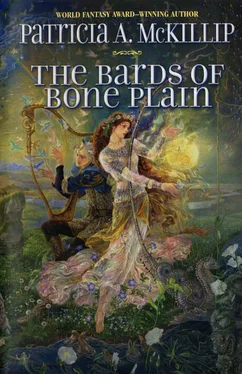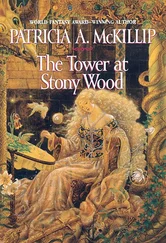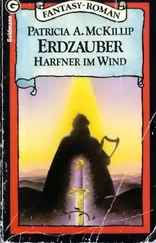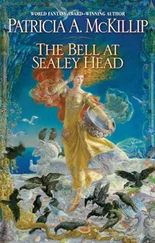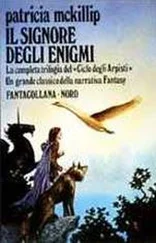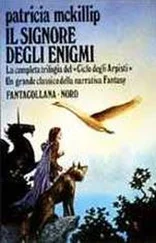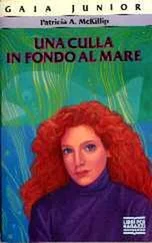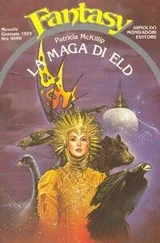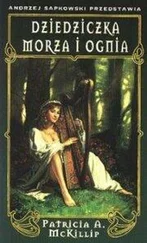Welkin answered, and Nairn started, remembering that he was not alone, that the bard had his own very powerful reasons to be there, and they had a contest to finish.
“What must we do?” Nairn’s voice came out as a poor, shredded phantom of itself, splintered between fear and wonder and the endless songs he had sung to get where he stood.
“Play,” Welkin answered grimly. “Play your heart out. That’s the only true door out of here.”
“Play,” a wraith echoed, a woman robed in orange and purple, her gray-gold braids wound with golden thread. “The ‘Ballad of Enek and Krital.’ You, Pig-Singer. Play it the way I sang it.”
Nairn’s mind went instantly blank. These were all court bards, he knew, no matter how forgotten the courts, and he doubted that even Declan’s knowledge had reached as far back as they went. But his fingers were moving again, suddenly, along the path of a teasing little phrase that had danced out of nowhere into his head. The wraith was smiling by the end of it, the rich threads in her hair spiraling with reflections of fire as she nodded. She said nothing. Another bard, an old man in white, with long hair and a longer beard, broke the brief silence after Nairn finished.
“Play ‘The Gathering of Crows,’ Welkin.”
A song Nairn had never heard, the ballad of a dying young warrior, melted through his heart. The old bard sang out of the harsh beginnings of time and song, both stripped to their essences. It sounded eerie, haunting, as though a stone on the plain were singing to itself. Nairn’s skin prickled again with sudden, cold terror. He was going to lose this contest. The scruffy wanderer with the mismatched eyes and a voice like a collision of old bones and shards, knew the songs that had been buried with these wraiths. Where Welkin had heard them, what graves he had sat on, listening to the singing of the brambles growing out of hollow skulls, Nairn could not imagine. But somewhere in his travels, Welkin had learned the songs of the dead.
He would walk out of this tomb triumphant and alive and take his place as Royal Bard in King Oroh’s court. Wealth, honor, and all the music of the realm would be his. And there Nairn would be, as ever, outside the walls, outside the windows, looking in at what he could not have.
At that unlikely moment, as he stood within the heart of the oldest secret of the plain, Nairn heard Declan’s voice.
The magic is in the harp ...
The young lover died; the crows descended. There was not a word, not so much as a flash of fire lit silver or running thread of gold from the motionless listeners.
Then a third wraith spoke. “Pig-Singer. ‘The Journey of the Wheel.’ ”
Nairn raised his harp, hoping against hope that his fingers would know the song that he was certain, in all his rambles, he had never encountered. They hovered, silent. The wraiths stood as silently, waiting.
Then his fingers moved to the deepest string on the harp, played that one string all at once, echoing the deep, fierce longings, despair, and certainty strung along Nairn’s sinews, reverberating in his bones, that Welkin cheated, that Welkin had no great gifts, that all the ancient power belonged to his harp, and Nairn could break those strings with a wish and prove it.
One string in Welkin’s harp did snap, before the old bard himself gave an anguished, untuned cry. The harp dropped first, then the harper, following it to earth.
From out of the suddenly starry sky, stones began to fall.
Quennel sent his message to the school before the day ended: a formal request, brilliant with colored ink and the king’s seal, that a search for a new Royal Bard should be called without delay across the land, and all musicians from village to high court be welcomed to compete on Stirl Plain on the first day of summer. Zoe was stunned by the date. It seemed scant breaths away, one final smile from the moon at spring before it turned its face toward summer. But, she realized, any day within the next century that pitted her against Kelda would be too soon.
“I can’t do it,” she whispered numbly as she stood staring at the parchment pinned to the board where all could see. Students and teachers jostled around her, exclaiming, laughing with excitement; she could almost feel the air tuned to their tension as they mentally tightened their strings and calculated their chances. “Quennel, I can’t win this thing for you.”
She could hear his answer, his aged, light eyes fierce and burning: Do it anyway.
“Zoe.”
She started. It was Phelan beside her, whom she hadn’t seen since the previous evening, when he had appeared so unexpectedly in the fussy little inn, his father blowing in the back door like a squall at the same time. Kelda had said something, or maybe Jonah had. Then she had found herself hurrying along the walkway between herbaceous borders, caught in a scurry of students fleeing the place as though they had been discovered stealing the tea service.
Phelan’s fingers coaxed her out of the crowd; she looked at him silently, puzzled, when they stopped under the shadow of an oak tree. He seemed weary, oddly bruised around the edges. His father, she thought instantly. But that wasn’t what came out first.
“What made you go off with Kelda last night?” he asked her bewilderedly.
She gazed at him a moment longer, not entirely sure herself. Then she gave him the simplest answer. “Something Quennel told me. I wanted to know if it’s true.”
“Is it?”
She paused, searching his face again. They had known one another so long and so well it seemed by now there would be nothing she couldn’t read in his eyes. He looked unsettled, wary and strangely distant, as though half his mind had gone off on some wayward road she didn’t know existed. They both had secrets, she realized then, from each other.
“I don’t know,” she answered, to her own surprise. “Maybe. I don’t know yet. I have to find out. Phelan ... I’m not really sure what happened at the inn. I heard a word spoken when you came in, and—”
He shook his head. “It was a harp note.”
“No—One of them—Kelda or your father—said—”
“You think it was my father?” he asked incredulously. “He didn’t have a harp.”
“I didn’t hear a harp note.”
“That’s what I heard. The power was in the harp. That’s what—Well.” He looked away from her briefly, at the memory. “Who did what is not so important at this moment. What’s important is: you’re doing this for Quennel?”
She nodded, and wasn’t, in the next moment, entirely sure that was true. “He’s afraid of Kelda,” she told him. “I want to find out why.”
Some of the confusion lifted; his eyes became familiar again, seeing what he thought he knew. But he was still frowning. “Be careful,” he pleaded. “I’m not sure myself what happened, but Quennel may well be right to be afraid. My father would say so.”
“Would you?” she asked quickly. “You seemed indifferent to Kelda yesterday.”
“I’m not anymore. Not after last night. Somebody blew the back door of the inn off its hinges, and Kelda was the one with the harp.” She stared at him; his mouth crooked. “Magic,” he admitted, and she felt the word flow like water through cracked, parched earth.
“Yes.” She shook her head, half-laughing suddenly, and stepped into light. She lifted her face to it, let it burn the edges of her vision, let the wind blow her hair like leaves. “Yes.”
“You’re bewitched,” Phelan breathed, watching from the shadow.
“I’m fascinated,” she amended. “That’s better than being afraid.”
“Zoe—”
“Don’t worry. I promise I will be careful. You, too. Stay away from flying doors and strings that speak.”
Читать дальше
